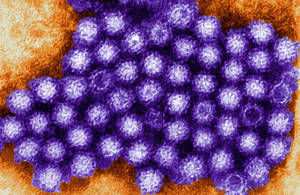Norovirus: a nasty but common Winter bug
Public Health England (PHE) says recent rise in cases of the winter vomiting seasonal Norovirus is not unexpected.

Norovirus under a microscope
PHE is reminding people of the importance of practising good hand hygiene, staying away from places like hospitals and care homes and avoiding preparing food when ill to limit the spread of norovirus – which causes unpleasant, but short lived, vomiting and diarrhoea.
The increase in cases of norovirus that we are seeing at the moment is common for this time of year and is so far not unexpected compared with the previous 5 years (14% higher than the average for the same period over the last 5 seasons).
Nick Phin, National Infection Service Deputy Director, PHE said:
Cases of this infection are beginning to increase, although they are still at levels that we would expect to see around this time of year, which is traditionally the norovirus winter vomiting season.
Most people will make a full recovery within 1 to 2 days but it is important to drink plenty of fluids during that time to prevent dehydration, especially in the very young or elderly. If people have diarrhea and vomiting they should not prepare food for others and we advise that they should avoid visiting GP surgeries, care homes and hospitals if they have symptoms. If anyone is concerned they should contact NHS 111 or talk to their GP by phone.
One of the best ways to protect against norovirus and to help prevent infection is by practising good hygiene. This includes thorough hand washing after using the toilet and before eating or preparing foods.
Norovirus is a short lived infection causing diarrhoea and vomiting lasting 1 to 2 days and it is the most common stomach bug in the UK, affecting people of all ages. It is highly contagious and easily spread in settings where people are in close contact with one another, such as hospitals, schools and care homes.
It is transmitted by contact with hands or surfaces that the virus has landed on from an infected person. All contaminated surfaces should be thoroughly disinfected after any episode of illness. Food preparation should also be avoided by those who have been ill until 48 hours after symptoms have disappeared.
The symptoms of norovirus are very distinctive – people often report a sudden onset of nausea followed by projectile vomiting and watery diarrhoea. Illness typically lasts about 24 to 48 hours. People infected will usually recover in 1 or 2 days without serious or long-term health effects.